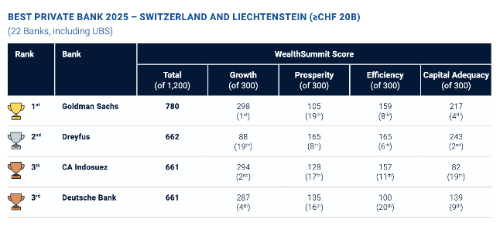Goldman Sachs Tops Swiss Private Banks
An American institution has done what seemed unthinkable – outshining Switzerland’s own private banking champions. Goldman Sachs now ranks as the country’s best private bank, according to an exclusive study seen by finews.asia. The findings reveal a sobering truth: while assets under management have risen, fresh inflows have dried up – many Swiss private banks are losing their growth momentum.
In the latest Wealth Management Study by Zurich-based research firm Fin21, Goldman Sachs takes the top spot, surpassing established names like Julius Baer, Pictet, and Lombard Odier.
(Source: Wealth Management Study, click to enlarge)
The study, now in its fourth edition, was conducted by lecturer and Fin21 founder Christoph «Chris» Künzle. Based on the published financial data of 69 Swiss banks, it measures performance across four criteria – growth, capital strength, efficiency, and prosperity (see here the data).
The rankings across these four categories determine the overall winners. As the study further explains, separate top winners are identified for two segments – private banks with less than 20 billion francs in client assets under management (AUMs), and those with more than 20 billion francs.
Unsung Champions of Efficiency
While global giants dominate headlines, several lesser-known institutions perform remarkably well. Basel’s Scobag ranks as both the most efficient and best-capitalized bank in Switzerland.
Geneva’s Mirabaud posted the strongest prosperity growth, while three Lugano-based banks – Banca del Ceresio, Credinvest Bank, and BG Private Bank – also feature prominently. In German-speaking Switzerland, MBaer Merchant Bank and BZ Bank are among the top performers.
Growth Without Inflows
The data tell a clear story: the traditional Swiss private banking model is approaching its limits. Although favorable markets lifted total client assets by nearly 10 percent to 8.7 trillion francs in Switzerland and Liechtenstein. This increase was largely market-driven rather than the result of new inflows.
«The industry’s expansion is not fueled by new money,» says Künzle. Net new money fell by more than fourteen percent year-on-year – an alarming sign that Switzerland and Liechtenstein are struggling to attract fresh wealth, much of which is now created and booked in hubs like Singapore, Dubai, and the US.
Beyond «Old Europe»
«To maintain their leading positions as offshore centers, Switzerland and Liechtenstein must expand their global reach and client acquisition capabilities beyond the traditional core markets of Old Europe,» Künzle warns.
«Preserving the status quo will not suffice – future success depends on capturing new wealth flows and reigniting growth dynamics across the ecosystem,» he adds.
Rising Costs, Declining Margins
The study also highlights a worrying trend: personnel expenses at Swiss private banks have remained high or even increased. With slower inflows and rising costs, the sustainability of the Swiss private banking model is under pressure.
Cost discipline and efficiency gains have helped sustain profitability – the median cost-income ratio improved slightly to below 77 percent – but this was likely driven more by market tailwinds than by structural cost optimization. Persistently high staff costs underline that long-term efficiency gains remain a strategic priority.
Shrinking Global Weight
Zurich-based finance professor emeritus Martin Janssen, in his foreword to the study, points to another imbalance: «A striking 66 percent of total assets managed by Swiss private banks sit with UBS – a figure that underscores the enormous weight of Switzerland’s last global universal bank.»
Excluding UBS and other heavyweights like Pictet and Julius Baer, the remaining private banks manage on average around 25 billion francs each – a modest figure that underscores the declining international significance of Switzerland’s private banking industry, a trend mirrored in indices such as the Financial Center Index.
When Trust Goes Digital
«In a world that is faster, more mobile, and likely more decentralized, these shifts pose entirely new challenges for private banks,» Janssen notes. The expertise and trust once embodied by bankers will increasingly be supplemented – or replaced – by artificial intelligence (AI) and the technical, economic, and cryptographic mechanisms of blockchain.
Because blockchain-based trust is institution-independent, it levels the playing field and intensifies global competition. «Banks would be well advised to act not just on paper, but through concrete, feasible projects,» Janssen says. Still, he sees grounds for optimism: Switzerland’s strong educational base and culture of innovation remain enduring strengths.
Goldman Sachs’ Swiss Playbook

Goldman Sachs' new offices at Zurich's prestigious Bahnhofstrasse (Image: GS)
The study’s results reflect precisely that shift. Goldman Sachs Switzerland has built its offering for ultra-high-net-worth individuals (UHNWIs) around the traditional strengths of Swiss private banking – discretion, service, and expertise – while integrating the global scale and capabilities of a universal bank.
This formula has paid off. The bank posted record-high inflows over the past twelve months, even as its peers struggled. The growth justifies its substantial personnel costs – and its recent move to Zurich’s prestigious Bahnhofstrasse.
New Benchmark for Swiss Banking
«We did not only move into our new offices because of past performance, but in light of our business expectations for the years ahead,» said Pascal Meinherz, General Manager of Goldman Sachs Bank in Switzerland, on Thursday evening at the awards ceremony in Zurich.
Goldman Sachs may be American, but in Switzerland, it now sets the benchmark for what Swiss banking success looks like.





























